Itinerary
Day itinerary:
The imposing façade of El Morro fortress is just one of the many UNESCO World Heritage Sites in San Juan. Admire the colorful colonial buildings from your casually elegant ship, docked right in the heart of Old San Juan.
Day itinerary:
This is the Caribbean as you’ve always imagined it, with yacht-filled harbors set against volcanic mountains and endless stretches of palm-fringed beach. The underwater world here attracted the likes of Jacques Cousteau, but even novice snorkelers will enjoy exploring these impossibly blue waters.
Day itinerary:
The UNESCO site Pitons’ with their two majestic volcanic peaks and 24 miles of vibrant coral reef welcome you to St. Lucia. Nearby Pigeon Island National Park features impressive ruins of English forts, archaeological relics of Arawak Indians, and splendid beaches.
Nutmeg, cinnamon, cloves, cocoa those heady aromas fill the air in Grenada (pronounced gruh-nay-da). Only 21 miles (33½ km) long and 12 miles (19½ km) wide, the Isle of Spice is a tropical gem of lush rain forests, white-sand beaches, secluded coves, exotic flowers, and enough locally grown spices to fill anyone’s kitchen cabinet. St. George’s is one of the most picturesque capital cities in the Caribbean, St. George’s Harbour is one of the most picturesque harbors, and Grenada’s Grand Anse Beach is one of the region’s finest beaches. The island has friendly, hospitable people and enough good shopping, restaurants, historic sites, and natural wonders to make it a popular port of call. About one-third of Grenada’s visitors arrive by cruise ship, and that number continues to grow each year. Grenada’s capital is a bustling West Indian city, much of which remains unchanged from colonial days. Narrow streets lined with shops wind up, down, and across steep hills. Brick warehouses cling to the waterfront, and pastel-painted homes rise from the waterfront and disappear into steep green hills. The horseshoe-shaped St. George’s Harbour, a submerged volcanic crater, is arguably the prettiest harbor in the Caribbean. Schooners, ferries, and tour boats tie up along the seawall or at the small dinghy dock. The Carenage (pronounced car-a-nahzh), which surrounds the harbor, is the capital’s center. Warehouses, shops, and restaurants line the waterfront. The Christ of the Deep statue that sits on the pedestrian plaza at the center of The Carenage was presented to Grenada by Costa Cruise Line in remembrance of its ship, Bianca C, which burned and sank in the harbor in 1961 and is now a favorite dive site. An engineering feat for its time, the 340-foot-long Sendall Tunnel was built in 1895 and named for Walter Sendall, an early governor. The narrow tunnel, used by both pedestrians and vehicles, separates the harbor side of St. George’s from the Esplanade on the bay side of town, where you can find the markets (produce, meat, and fish), the Cruise Ship Terminal, the Esplanade Mall, and the public bus station.
Day itinerary:
Inhale the intoxicating aroma of the “Isle of Spice” as your eyes feast on what is widely claimed to be the most beautiful city in the Caribbean. Spend the day on 2-mile-long Grand Anse beach, and before you go, a taste of nutmeg ice cream is a must.
You can easily explore all of Gustavia during a two-hour stroll. Some shops close from noon to 3 or 4, so plan lunch accordingly, but stores stay open past 7 in the evening. Parking in Gustavia is a challenge, especially during vacation times. A good spot to park is rue de la République, alongside the catamarans, yachts, and sailboats.
Day itinerary:
Affectionately known as St. Barts, the Caribbean’s most chic island adds a French flair to Riviera-like beaches and duty-free boutiques. Walk past gingerbread cottages in search of celebrities, shop for designer fashions, or sip the island’s signature ti punch as kite surfers fly by.
Jost Van Dyke, four miles long, is truly known as the ‘barefoot island’. The smallest of the British Virgin Islands, it is known as a popular destination for yachts and is celebrated for its casual lifestyle, protected anchorages, fine beaches and beachfront restaurants and bars. The island has fewer than 200 inhabitants and they are widely known as a welcoming people. The island’s name conjures up its rich, colorful past. Jost Van Dyke is said to have been named for an early Dutch settler, a former pirate. At Great Harbour, Little Harbour, and White Bay there are safe, protected bays and pristine beaches shaded with coconut palms and seagrape trees. Discover inviting shops selling local treasures, restaurants, and bars. ‘The Painkiller’, one of the Caribbean’s most popular drinks, originated at the Soggy Dollar Bar. Foxy’s and Gertrude’s in White Bay are renowned for drinks made with the island’s famous rum, frosty beers, and tales of pirates and sunken treasure. Explore Jost Van Dyke’s history in the vegetation-covered ruins of centuries-old sugar mills, or on the old trails that crisscross the island. Revel in the natural beauty of the pristine, untouched beaches. Hike up to the highest spot on the island, Majohnny Point, and take in a stunning 360 degree view of the Caribbean. Relax in the natural ‘bubble pool’, a popular tourist attraction. Jost Van Dyke conjures up images of what the British Virgin Islands may have looked like many years ago.
Day itinerary:
For an island comprised of a mere eight square miles, it’s amazing how much there is to do on Jost Van Dyke. Visit the national park on nearby Diamond Cay, snorkel among swaying sponges and angelfish at Sandy Spit, or pilot your own boat around Sir Francis Drake Waterway. After all that, you’ll be ready for an evening drink on the beach — where you can admire your Windstar ship aglow in the harbor.
Day itinerary:
The imposing façade of El Morro fortress is just one of the many UNESCO World Heritage Sites in San Juan. Admire the colorful colonial buildings from your casually elegant ship, docked right in the heart of Old San Juan.
Day itinerary:
Small Isla Catalina boasts gleaming white-sand beaches ringed by coral reefs beckoning snorkelers. The island is a protected Natural Park where one beach is completely protected from the wind and the sea is delightfully calm. While beaches occupy more than 2/3 of the coastline, Isla Catalina also has unique rocky coasts and cliffs. One of the best diving sites of the Dominican Republic, Muro, can be found here. It boasts an impressive underwater wall over 328 feet deep. Isla Catalina is also the only place in the D.R. where raccoons and wild hares can be found.
Day itinerary:
La Capital, as Santo Domingo is affectionately known, is a UNESCO site and one of the oldest cities in the Caribbean, with Zona Colonial buildings dating back to the 1500s. Santo Domingo is also considered the most modern metropolis in the Caribbean doing a great job of converging old and new. At the heart of the Zona Colonial, a pedestrian-friendly maze of cobblestones and interesting architecture is the first cathedral built in the New World. Find time to sample the aromatic coffee and cacao.
Cartagena’s magnificent city walls and fortresses, now a UNESCO World Heritage Site, enclose a well-restored historic center (the Cuidad Amurallada, or walled city) with plazas, churches, museums, and shops that have made it a lively coastal vacation spot for South Americans and others. New hotels and restaurants make the walled city a desirable place to stay, and the formerly down-at-the-heels Getsemaní neighborhood attracts those seeking a bohemian buzz. The historic center is a small section of Cartagena; many hotels are in the Bocagrande district, an elongated peninsula where high-rise hotels overlook a long, gray-sand beach.When it was founded in 1533 by Spanish conquistador Pedro de Heredia, Cartagena was the only port on the South American mainland. Gold and silver looted from indigenous peoples passed through here en route to Spain and attracted pirates, including Sir Francis Drake, who in 1586 torched 200 buildings. Cartagena’s walls protected the city’s riches as well as the New World’s most important African slave market.
Day itinerary:
Welcome to the sparkling city of Cartagena, where the gold and jewels of the Spanish Main awaited shipment across the Atlantic. No pirate could resist, nor will you be able to when you visit this historic city. The Old Town, a UNESCO World Heritage Site, is surrounded by 400-year-old walls and contains a plethora of churches, fortresses, and restored colonial mansions. Outside the walls are more treasures: Climb the massive Castillo de San Felipe to investigate its maze of hidden tunnels, or shop for the perfect emerald.
Cartagena’s magnificent city walls and fortresses, now a UNESCO World Heritage Site, enclose a well-restored historic center (the Cuidad Amurallada, or walled city) with plazas, churches, museums, and shops that have made it a lively coastal vacation spot for South Americans and others. New hotels and restaurants make the walled city a desirable place to stay, and the formerly down-at-the-heels Getsemaní neighborhood attracts those seeking a bohemian buzz. The historic center is a small section of Cartagena; many hotels are in the Bocagrande district, an elongated peninsula where high-rise hotels overlook a long, gray-sand beach.When it was founded in 1533 by Spanish conquistador Pedro de Heredia, Cartagena was the only port on the South American mainland. Gold and silver looted from indigenous peoples passed through here en route to Spain and attracted pirates, including Sir Francis Drake, who in 1586 torched 200 buildings. Cartagena’s walls protected the city’s riches as well as the New World’s most important African slave market.
Day itinerary:
Welcome to the sparkling city of Cartagena, where the gold and jewels of the Spanish Main awaited shipment across the Atlantic. No pirate could resist, nor will you be able to when you visit this historic city. The Old Town, a UNESCO World Heritage Site, is surrounded by 400-year-old walls and contains a plethora of churches, fortresses, and restored colonial mansions. Outside the walls are more treasures: Climb the massive Castillo de San Felipe to investigate its maze of hidden tunnels, or shop for the perfect emerald.
The San Blas archipelago is located off the Caribbean coast, east of Colon, and is made up of 365 islands that range in size from tiny ones with a few coconut palms to islands on which hundreds of Kuna Indians live. Only about fifty are inhabited. The Kuna rule the San Blas Territory with internal autonomy, and have tightly preserved their language and cultural traditions over the centuries despite influences from European colonies. In addition to their own language, Spanish is widely spoken and many men work on the mainland, but live on the islands. Women wear costumes with unique designs based on local themes, geometric patterns, and stylised fauna and flora. The island of El Porvenir is one of the main seats of government for the Kuna Indians. Many Kunas from the other islands came to settle on El Porvenir, bringing with them their traditional arts and crafts, including the famous molas. These intricately hand-sewn designs are made by the women of the tribes as part of their blouses and dresses. With the increased tourism, molas are now a favoured souvenir and craft item for visitors.
Day itinerary:
The San Blas Islands of Panama is an archipelago comprising approximately 378 islands and cays, of which 49 are inhabited, some by the Kuna people. Scattered over an area of about 100 square miles, the islands are the number 1 vacation destination in Panama although the Kuna work hard to protect their land against overwhelming tourism and keep the islands healthy and lovely, unique and untouched by culture. These white-sand and palm tree lined islands are encompassed by a coral reef and warm, crystal-clear water that is perfect for snorkeling and is home to a variety of marine life including dolphins, sharks and giant manta rays.
The provincial capital of Colón, beside the canal’s Atlantic entrance, is named for the Spanish-language surname of Christopher Columbus, though the Americans called it Aspinwall in the 19th century.. The city was founded in 1850 by Americans working on the Panama railroad and named Aspinwall for one of the railway engineers. Following completion in 1855, Colon gained in importance, which was furthered by the plans for an isthmian canal. During the time of the French canal attempt, a fire in 1885 burned the city nearly to the ground and left thousands of people homeless. Colon was rebuilt in the architectural style then popular in France. Buildings from that era plus the ones constructed by Americans between 1904 and 1914 are still in use today, although the majority is on the verge of collapse. In addition to its importance as a port, Colon boasts the world’s second largest duty-free zone, known as Zona Libre, which is contained in a huge fortress like, walled-off area with giant international stores. However, most of the merchandise is sold in bulk to commercial businesses throughout the country.
Day itinerary:
Explore the inner workings of the Panama Canal, head into the jungle to meet with Embera Indians, or take an aerial tram ride through the rainforest canopy.
Day itinerary:
One of the entrances to the Panama Canal on the Pacific side, Balboa/Fuerte Amador was founded in 1519 and is a short distance from Panama City. In 2012 Balboa was ranked #1 in Latin America in the category of world’s busiest container ports. Sightseeing highlights include the colonial homes, the Administration Building, the Goethals Memorial, the Prado, and the local handicraft markets of traditional Panamanian crafts.
Day itinerary:
One of the entrances to the Panama Canal on the Pacific side, Balboa/Fuerte Amador was founded in 1519 and is a short distance from Panama City. In 2012 Balboa was ranked #1 in Latin America in the category of world’s busiest container ports. Sightseeing highlights include the colonial homes, the Administration Building, the Goethals Memorial, the Prado, and the local handicraft markets of traditional Panamanian crafts.
Day itinerary:
Located within a Nature Preserve of 50 islands, and part of Chiriqui Marine National Park lovely Isla Parida boasts magnificent beaches, one of which is over 1,300 feet long. The crystal clear waters stay at 82 degrees year round and are filled with marine life. There are numerous hardwood trees like teak, mahogany, and eucalyptus, and fruit trees like mango, banana and coconut trees. Here you will be treated to Windstar’s Signature Beach Party on a secluded beach that faces the Pacific Ocean.
Wild, scenic and incredibly bio-diverse, Golfo Dulce is not on most tourists itineraries. The name, says it all, Golfo Dulce or sweet gulf, in English. After a well justified visit to the Golfo Dulce, located in the South Pacific region of Costa Rica, and adjacent to the Osa Peninsula, visitors will be delighted and perplexed, wondering why they would ever leave this wonderland. Several coastal hamlets reside along this enchanting gulf, namely Puerto Jiménez, Golfito, Zancudo and Pavones, as well as the Piedras Blancas National Park. This is one stop on the itinerary that won’t soon be forgotten. Easily one of the wettest and most humid sections in the country, Golfo Dulce and the southwest can receive more than 200 inches (500 cm) of rainfall per year. This assures the surrounding area will be thriving with wild and plant life, perfect for aspiring adventurers. Surrounded by Corcovado National Park to the southwest, and Costa Rica’s mainland to the northeast, Golfo Dulce serves up a large platter of entertainment for all who visit. Sprouting along the edges of the Golfo Dulce are mangroves and estuaries full of wildlife. Explore these ecosystems crowded with crocodiles, river otters, waterfowl, monkeys and much more. Fed by the Coto Colorado River, the Coto River Swamps are an excellent choice for discovering these uncanny wetlands and the secrets that lay within.
Day itinerary:
Picture Jurassic foliage growing down steep hillsides all the way to the waterline, the hoots of monkeys echoing through trees choked by orchids. Golfo Dulce is one of Costa Rica’s most biodiverse areas, where both the jungle and the sea brim with life. Explore the canals by kayak in search of javelinas, butterflies, and more bird species than in all of North America.This port is accessed with a wet landing.
Quepos allows tourists to experience a once in a lifetime nature experience in Manuel Antonio National Park without leaving any of the familiar amenities behind. The close proximity of the park, located just 4.3 miles (7 km) to the south, and a wide array of services makes Quepos the perfect place to visit for those who wish to explore this enchanting area. The amenities available include everything from banks, restaurants, hotels, gift shops, bakeries, bars, a hospital, supermarket and even a post office. The area was once dependent on banana plantations which used to line the surrounding area. After disease infiltrated the harvest, interest transferred to African Palms as the prominent crop. Now, tourism has deemed itself the major economic factor, contributing to just about everything in the area. Quepos lures in many tourists for its fantastic sport fishing. In fact, some have come solely to participate in this world class experience and have never left, but besides sport fishing, many other activities are available. Exploring this maze of wetlands by boat is amazing but not the only way to see crocodiles, monkeys, herons, raccoons and more. This small paradise has the perfect balance between nature and the comfort and facilities someone might need.
Day itinerary:
The former banana-exporting town of Quepos is your basecamp for a day of rainforest adventure. Take a walk along trails that weave up to waterfalls, or ride horseback to a beautiful jungle pool. A float trip through a mangrove swamp populated by monkeys, crocodiles, egrets, and herons is also available. Or you may choose a nature walk through Manuel Antonio National Park, with its lovely beaches, easy trails, and abundant animal life.
Day itinerary:
Located on the Gulf of Nicoya, the small town of Puerto Caldera is one of Costa Rica’s top attractions, perfect for travelers who like more off the beaten path destinations where the native Tico lifestyle can be experienced. It is the gateway to San Jose, Jaco and the big city of Puntarenas, plus Los Suenos and Tortuga Island. Carara National Park is nearby, the rainforest home to crocodiles, over 400 species of birds and is considered the most likely place to see scarlet macaws.
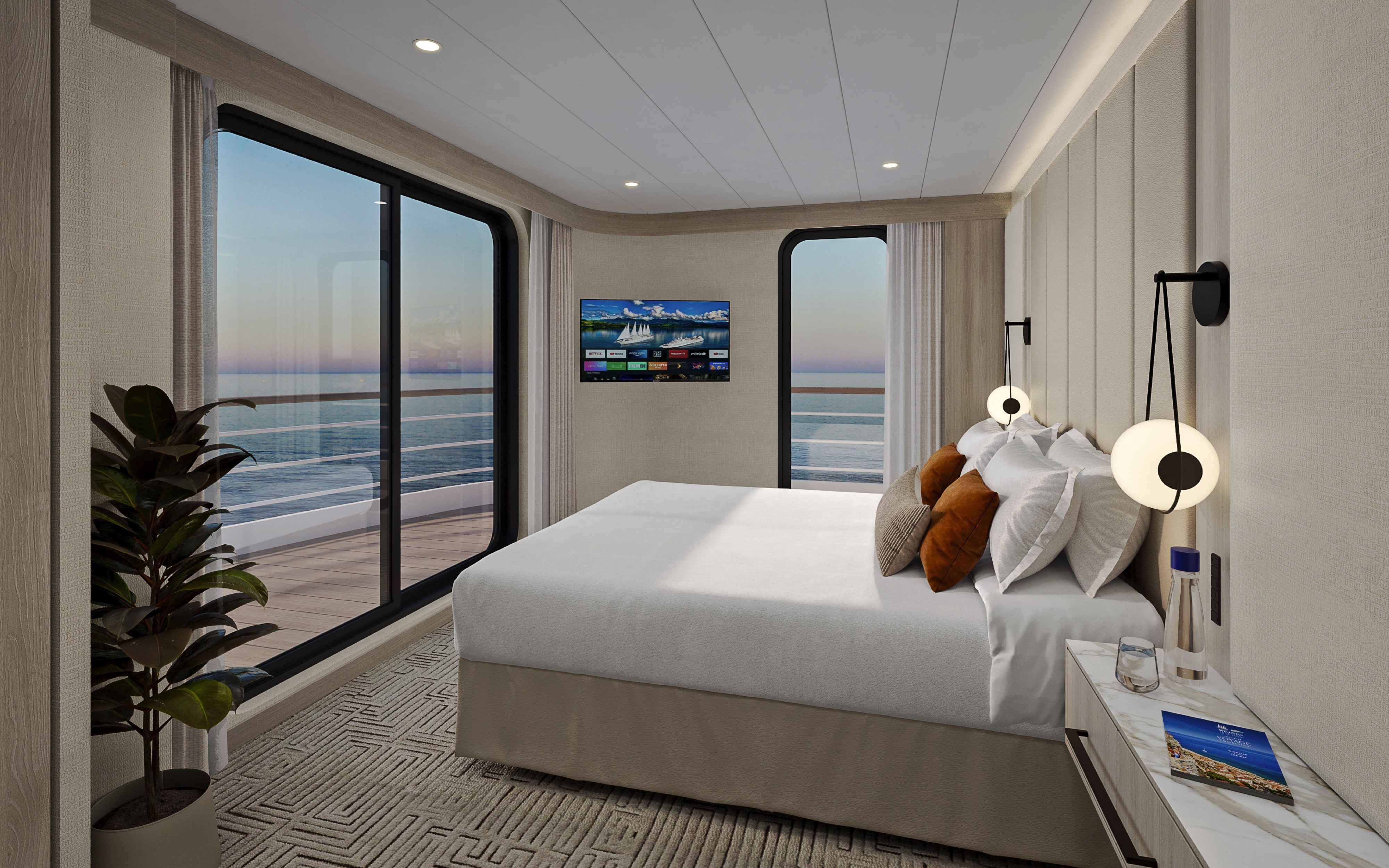
This luxurious 548-square-foot suite combines floor-to-ceiling windows and a wrap-around balcony for an unparalleled cruising experience. Perfect for evening cocktails or a private dinner, the wrap-around balcony adds 248 square feet of space and offers unobstructed views of the sea. The suite boasts a separate entryway — as well as separate dining and living areas — and a guest powder room. The bedroom includes an inviting king bed (convertible into two XL twin beds if desired), and the bathroom features a luxurious double walk-in mosaic glass shower with rain head and body jets. For family bookings, the adjacent suite can be combined to provide extra bedrooms and space for entertaining.
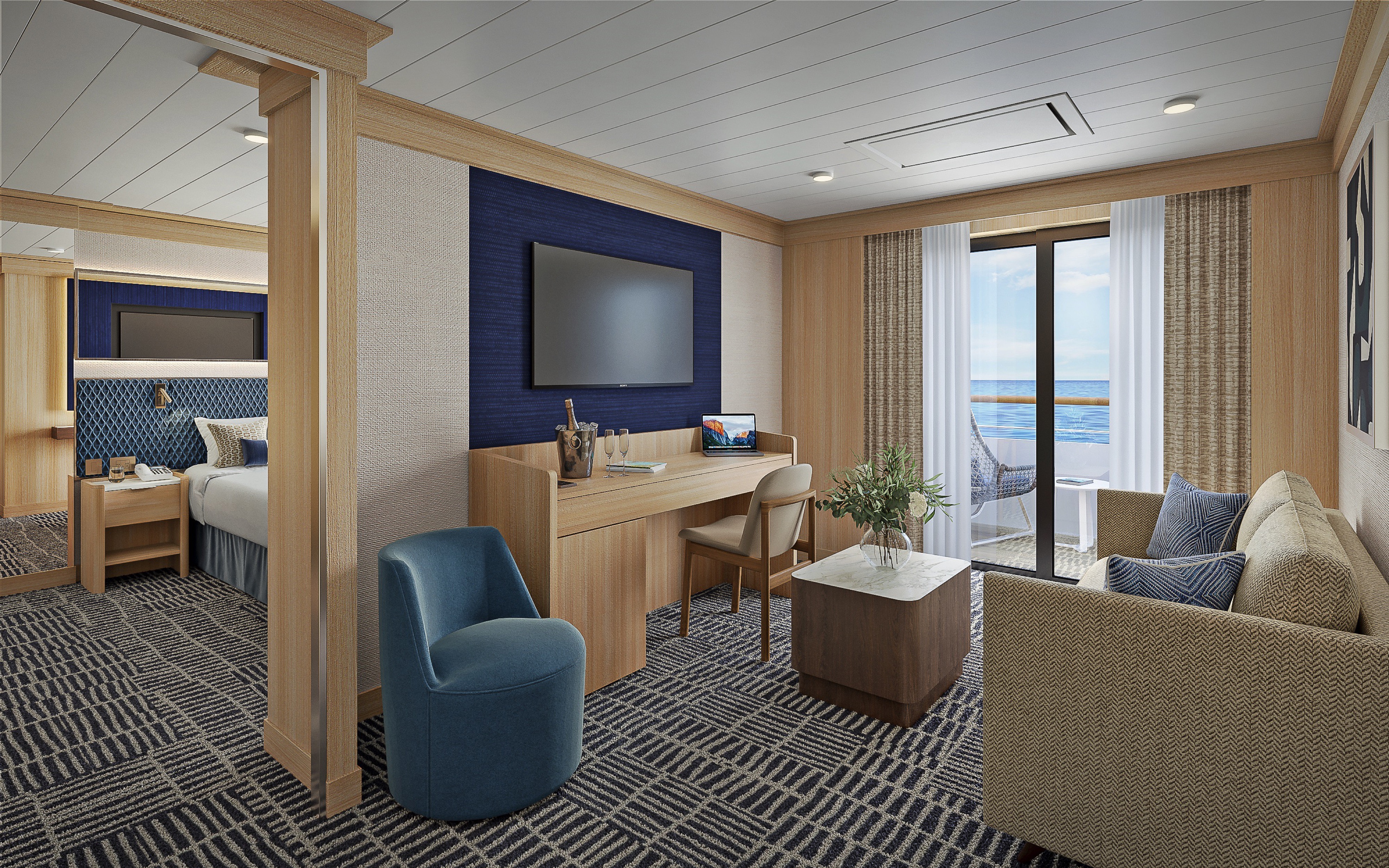
Step into a stylish and bright open living area with a spacious adjacent bedroom. This 353-square-foot suite welcomes you with spectacular views, courtesy of the sliding glass doors that lead out to your private balcony. The outdoor space adds another 110 square feet, enough to sit outside comfortably and enjoy the breeze. The bedroom features an inviting queen bed that can be converted into two twins if desired, while the bathroom includes a luxurious walk-in mosaic glass shower with rain head and body jets.
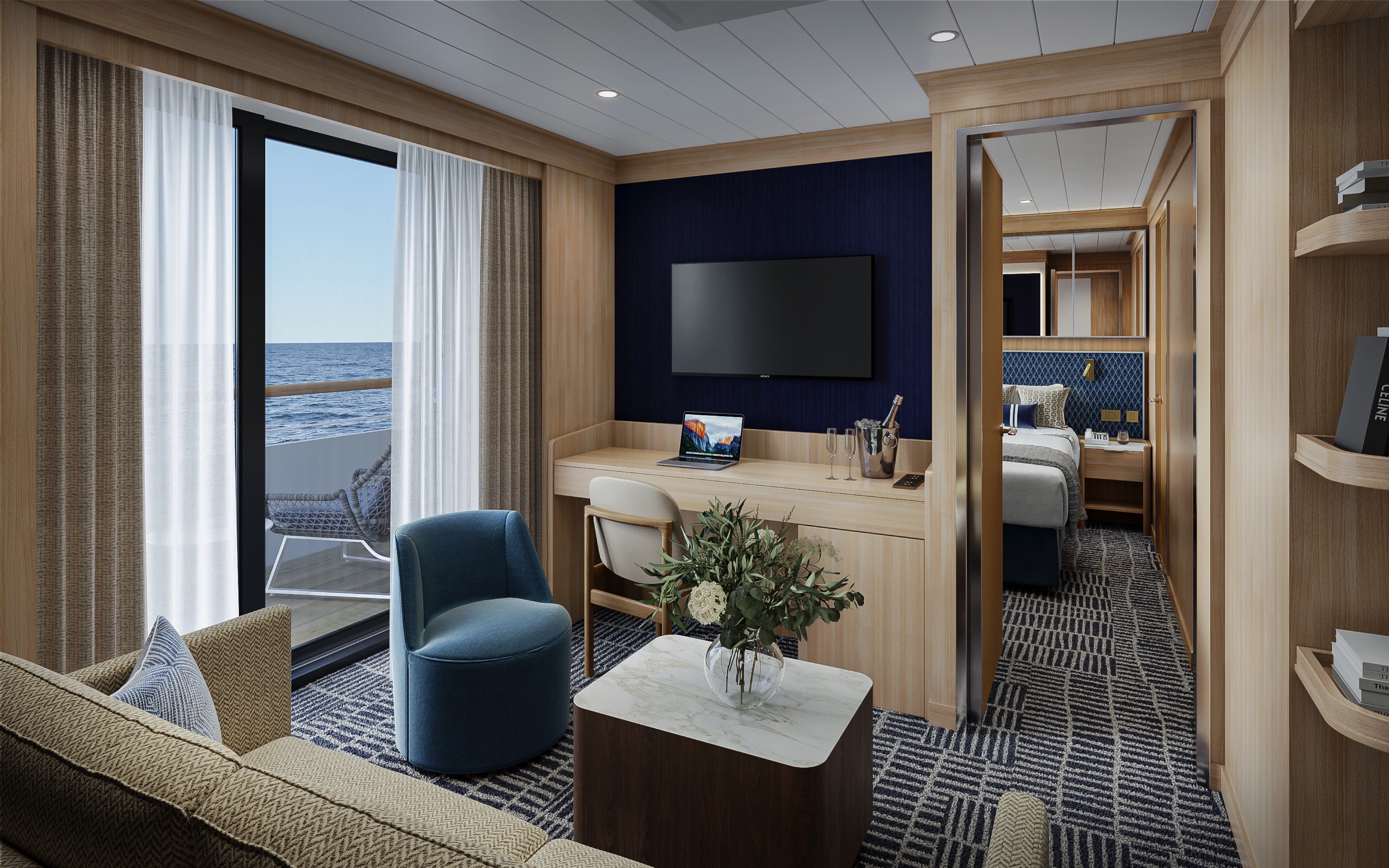
This 288-square-foot suite welcomes you with spectacular views, courtesy of the sliding glass doors that lead out to your private balcony. The outdoor space adds another 110 square feet, enough to sit outside comfortably and enjoy the breeze. The bedroom features an inviting queen bed (convertible into two twin beds if desired) and its own sliding glass door with balcony access, while the bathroom includes a luxurious walk-in mosaic glass shower with rain head and body jets.
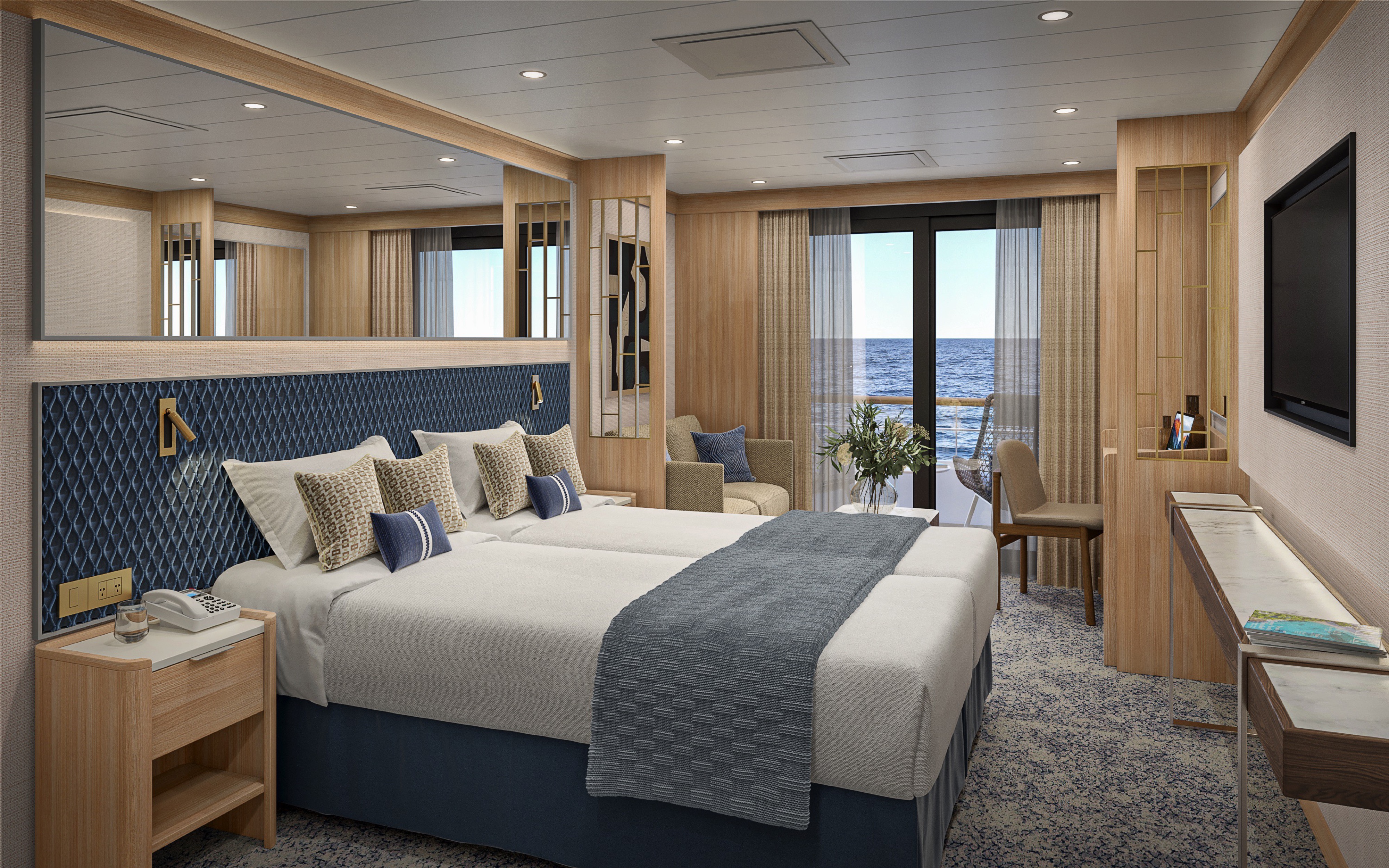
Located on deck 7, this 268-square-foot suite welcomes you with stylish comfort and stunning ocean views. Relax on your queen bed (convertible into two twin beds if desired) or lounge in the nearby living area. The outdoor space adds another 55 square feet, enough to sit outside comfortably and enjoy the breeze. In the bathroom, you’ll find a luxurious walk-in mosaic glass shower with rain head and body jets.

Located on deck 6, this 246-square-foot suite welcomes you with stylish comfort and stunning ocean views. Featuring an inviting queen bed (convertible into two twin beds if desired) and a pull-out sofa in the living area, the suite allows for triple occupancy. The outdoor space adds another 55 square feet, enough to sit outside comfortably and enjoy the breeze. In the bathroom, you’ll find a luxurious walk-in mosaic glass shower with rain head and body jets.

Stylish comfort and ocean views welcome you to this 225-square-foot suite. Relax on your queen bed (convertible into two twin beds if desired) or lounge in the nearby living area. The outdoor space adds another 55 square feet, enough to sit outside comfortably and enjoy the breeze. In the bathroom, you’ll find a luxurious walk-in mosaic glass shower with rain head and body jets.

Located at the middle of the ship, these 225-square-foot suites welcome you with stylish comfort and beautiful ocean views. Relax on your queen bed (convertible into two twin beds if desired) or lounge in the nearby living area. The outdoor space adds another 55 square feet, enough to sit outside comfortably and enjoy the breeze. In the bathroom, you’ll find a luxurious walk-in mosaic glass shower with rain head and body jets.
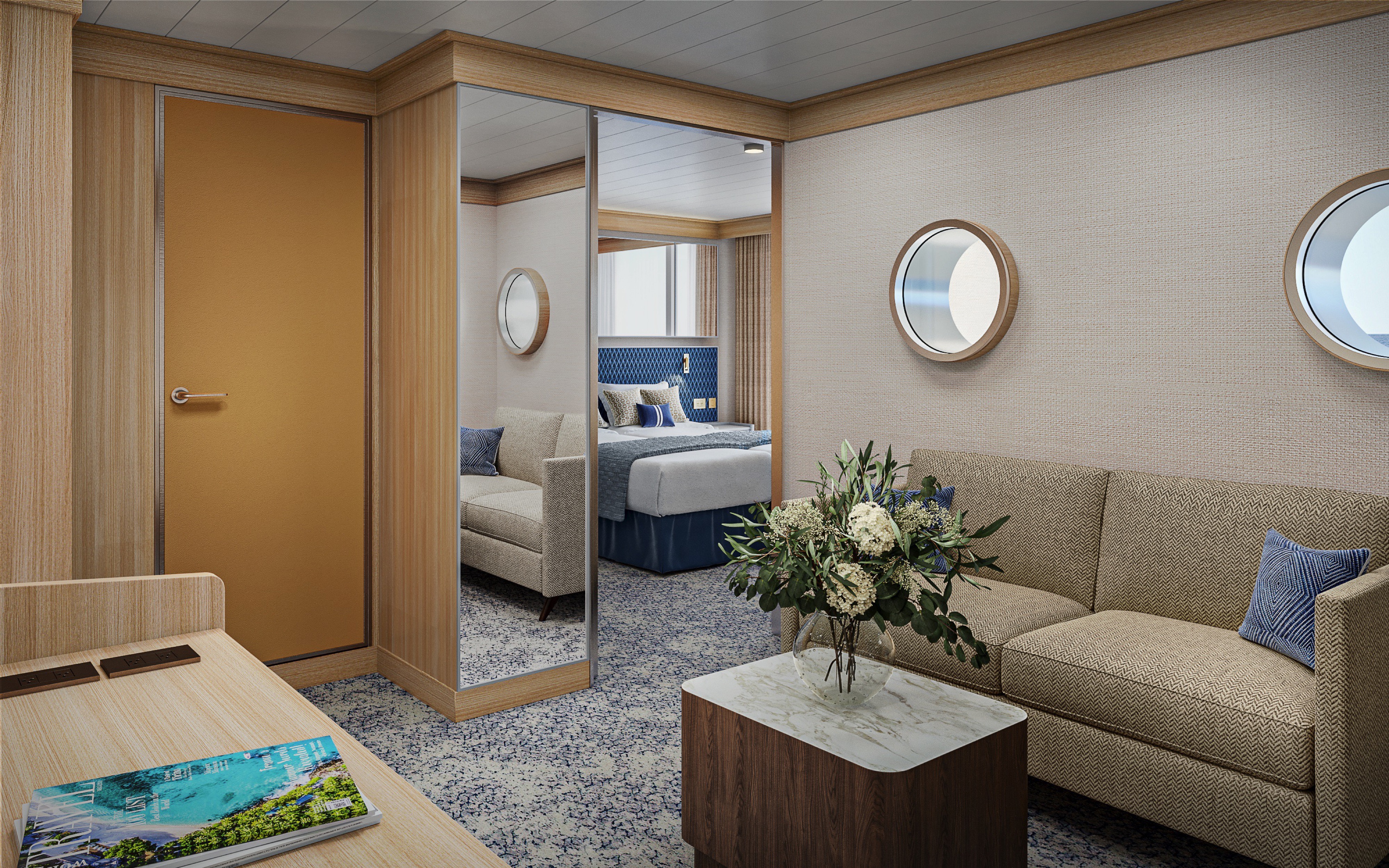
This roomy 301-square-foot suite features a wide floor-to-ceiling infinity window in the bedroom, allowing for stunning ocean views. You can even open the top half to enjoy the cool ocean breeze. This suite also features an inviting queen bed (convertible into two twin beds if desired) and a pull-out sofa in the separate living area, allowing for triple occupancy. In the bathroom, you’ll find a luxurious walk-in mosaic glass shower with rain head and body jets.
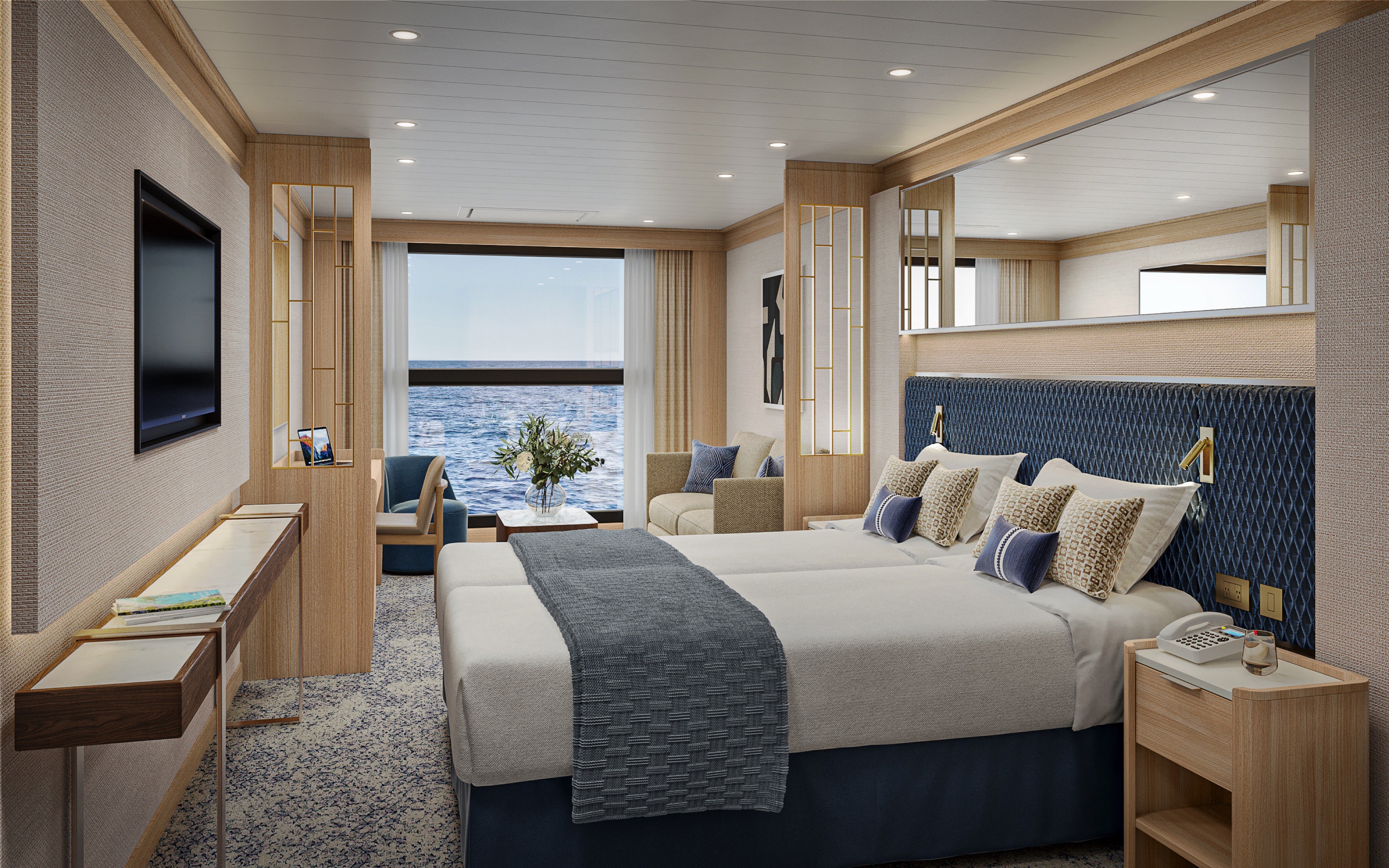
Located on deck 7, this 280-square-foot suite features a wide floor-to-ceiling infinity window that allows for stunning ocean views. You can even open the top half to enjoy the cool ocean breeze. Your suite features an inviting queen bed (convertible into two twin beds if desired), a walk-in mosaic glass shower and a comfortable living area where you can lounge and enjoy the view.

This 280-square-foot suite features a wide floor-to-ceiling infinity window that allows for stunning ocean views. You can even open the top half to enjoy the cool ocean breeze. Your suite features an inviting queen bed (convertible into two twin beds if desired), a walk-in mosaic glass shower and a comfortable living area where you can lounge and enjoy the view.
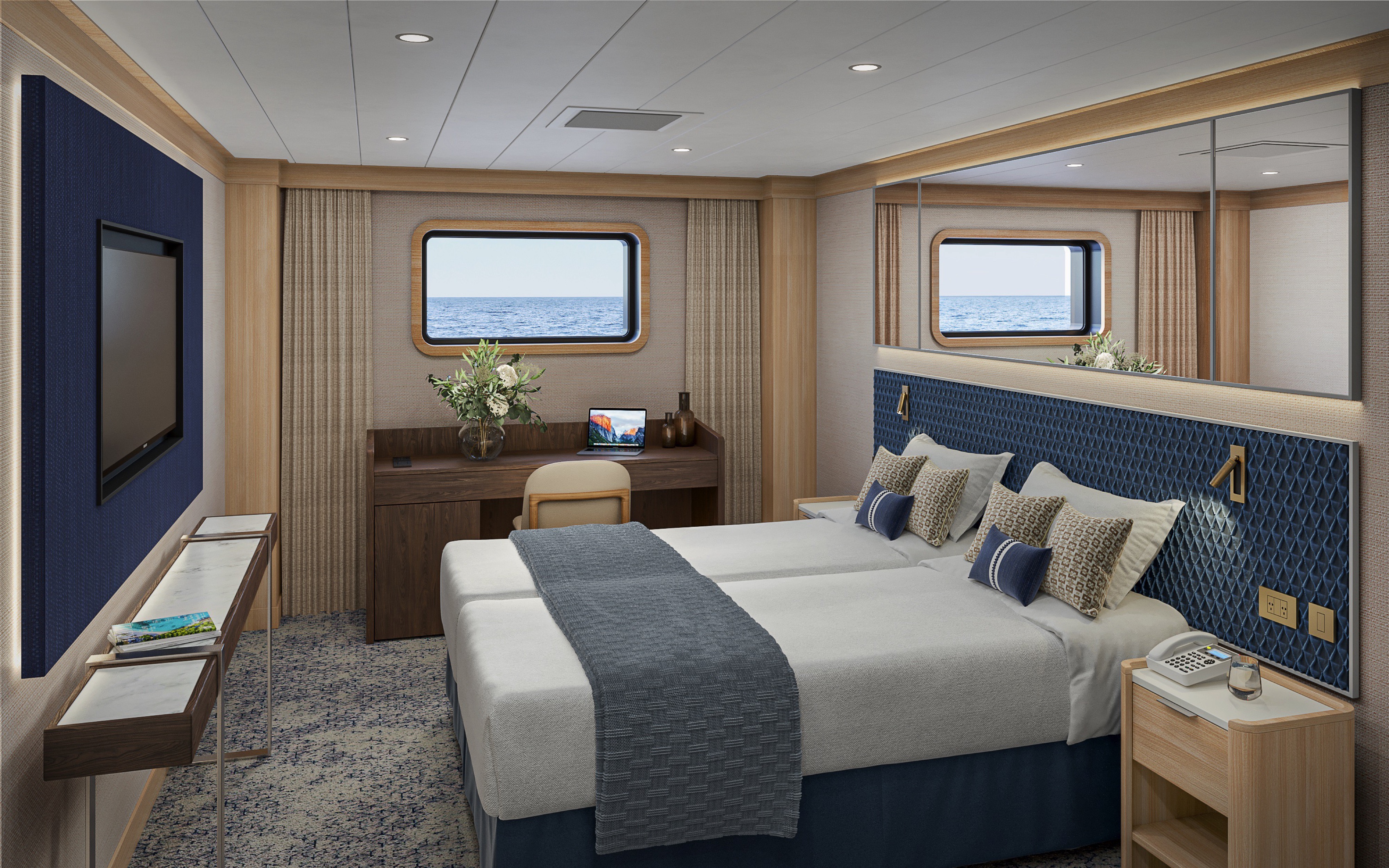
Experience the perfect blend of style and functionality in this thoughtfully designed 203-square-foot suite. The well-planned layout creates an ideal retreat with plenty of natural light, a view of the sea, a walk-in mosaic glass shower and an inviting queen bed (convertible into two twins if desired), perfect for unwinding after a day of fun and exploration.
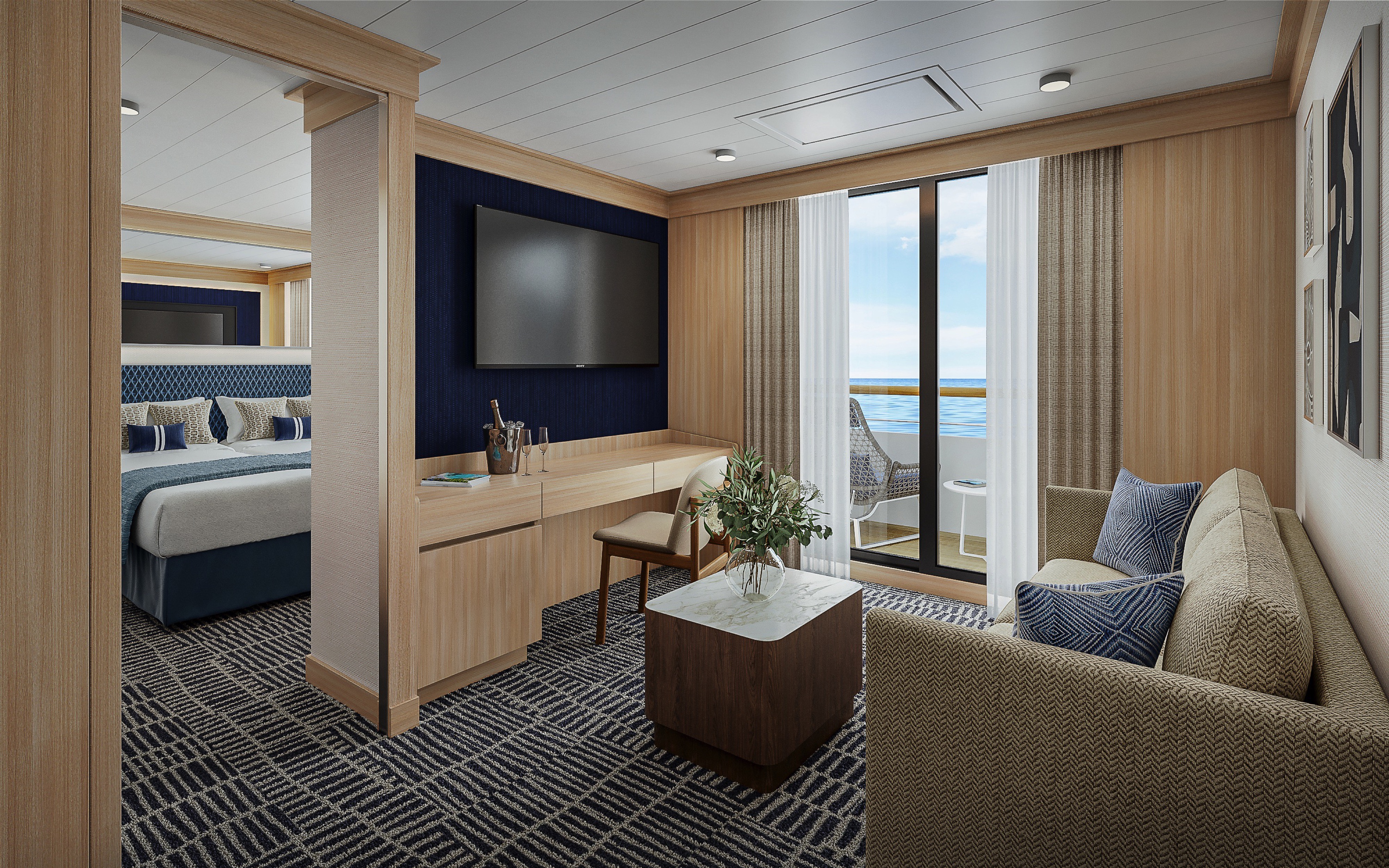
Step into a stylish and bright open living area with a spacious adjacent bedroom. This 380-square-foot suite welcomes you with spectacular views, courtesy of the sliding glass doors that lead out to your private balcony. The outdoor space adds another 110 square feet, enough to sit outside comfortably and enjoy the breeze. The bedroom features an inviting queen bed (convertible into two twin beds if desired) and its own sliding glass door with balcony access, while the bathroom includes a bathtub and walk-in mosaic glass shower with rain head and body jets.

Amphora presents a contemporary, international menu and fresh local dishes.

You’ll find all your traditional grilled and barbecued favorites (and discover new dishes from around the world) in our casual outdoor restaurant.

A pleasant lounge and all-day coffee bar, which is the perfect place to relax with new friends and enjoy the 270 degree views from atop the ship.

24-hour room service menu for in-room dining features coursed menu from the main Amphora dining room during dining hours.
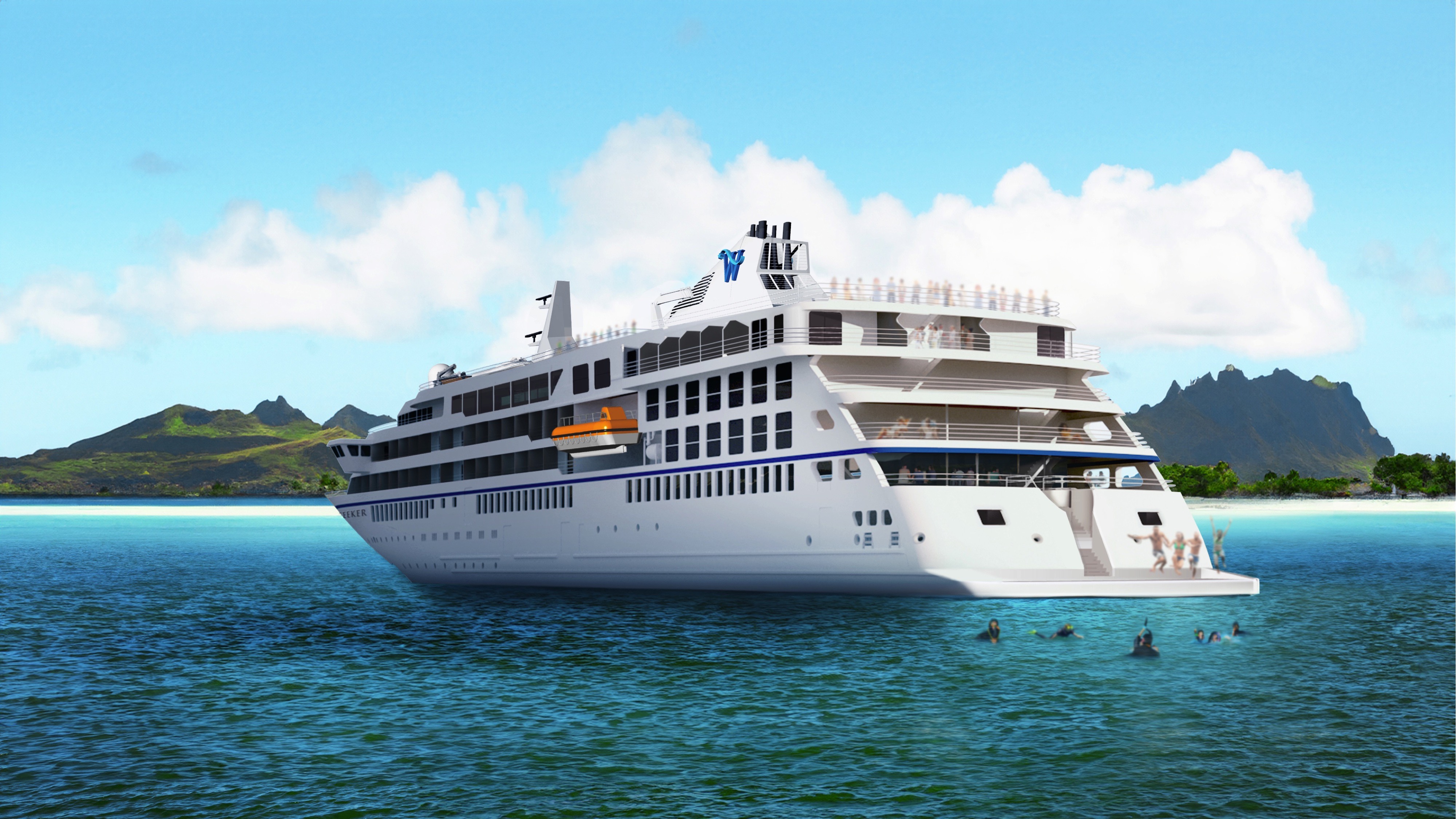
Swim directly from the yacht’s platform and enjoy complimentary snorkeling gear, paddleboards, kayaks and floatable watermats.

Guests can talk with the Captain and officers on watch, view the navigational charts with the crew and enjoy one of the best views on the ship.

Full-service salon and spa from around the world. Offerings include massages, body treatments, facials, manicures, andpedicures.
Windstar does not discriminate against persons on the basis of disability. We seek, to the extent feasible, to accommodate the needs of persons with disabilities. There are no elevators on Wind Star and Wind Spirit nor were the ships originally constructed to be wheelchair accessible. As a result, these ships may be unsuitable for people relying solely on wheelchairs. The other yachts are equipped with elevators, but staterooms on Wind Surf are not wheelchair accessible. Also note, there is no elevator access to board the ship. Star Pride, Star Breeze, and Star Legend have modified wheelchair accessible suites available.
Certain ports require the ship to anchor; in this case guests must be ferried into port. Service Dogs are permitted onboard ships if prior arrangements have been made at time of booking. In limited situations where an individual with a disability would be unable to satisfy certain specified safety and other criteria, even when provided with appropriate auxiliary aids and services, we may find it necessary to ask the individual to make alternative travel arrangements. It is essential that Windstar is notified of any special medical, physical or other requirements you may have at the time of booking.
Windstar Cruises is unable to accommodate children under eight (8) years of age. All Guests under 21 years of age must be accompanied by a parent, guardian or chaperone who is at least 21 years old. Parents, guardians, and chaperones are responsible for overseeing the onboard conduct of minors. Alcoholic beverages will not be served to guests under age 21.
For family groups booking multiple staterooms, the minimum age for at least one person in each stateroom is 18 years of age, provided they are traveling with a parent, guardian or chaperone.
The less you bring the better. We suggest clothes that are light, cool, and made of natural fabrics like cotton and silk. You may wish to bring warmer clothing (layers are best), if you are traveling on an Ocean Crossing or an autumn Mediterranean cruise.
The Dress Code – from 7 am – 6 pm guests are welcome to dress as they please with the exception of no swimwear in all public lounges and restaurants and no clothing with offensive language or graphics that distract from the comfort and well-being of others. The general shipboard style is elegant, but relaxed including jeans and Bermuda/ walking shorts.
In the evening – after 6 pm when dining in Amphora, Stella Bistro or Cuadro 44 by Anthony Sasso, the dress code is country club-type clothing. For men – nice slacks, polo shirts, button down shirts, shoes other than athletic shoes. Designer denim jeans without rips or holes or are multi-coloured are also acceptable. Sport coats are optional. Ties are not needed. For women – nice pants, skirts, tops, casual dresses, sundresses, nice sandals or casual shoes and designer denim dress jeans not ripped or multi-coloured or having holes. Blazers are optional.
No assigned seating in Amphora or Veranda restaurants. And what can be more casual than merely signing for onboard purchases? You will feel like this is your ship, your personal yacht. The environment inspires the attitude. Reservations are required for Candles and can be made on board.
For those guests traveling to Alaska, it’s important to wear the right gear. We have partnered with the leading expedition outfitter to offer an online Alaska clothing and accessories service that ships directly to your ship. You’ll find all the right gear for Alaska, packing lists, clothing tips and our limited-edition Alaska inaugural season jacket here..
Smoking or vaping is not permitted in any of the staterooms, suites, or public spaces, including all restaurants and corridors. Smoking and vaping is permitted on the outside decks in designated smoking areas only. Smoking cigars is permitted in a specific designated area on each yacht, however, only sold on board the Cigar Room of Wind Surf.
Windstar Cruises offers full internet capabilities, depending on course and position of the ship, as well as wireless internet service on all ships. Wi-Fi access is possible in most public areas, staterooms, and suites.
The Email Plan $60
This plan gives you 200 MB of data to use during your cruise. This plan is recommended for people who will be checking email and doing very limited browsing. The estimated minutes range from 15 to 60.
The Surfing Plan $120
This plan gives you 500 MB of data to use for additional browsing and small file transfers (such as posting pictures to a social media site). The estimated minutes range from 90 to 360 (approximately 5 hours).
The Ultimate Plan –
Unlimited Internet Package
-7 Day Cost $245
-8 Day Cost $280
-9 Day Cost $315
-10 Day Cost $350
-11 Day Cost $385
-14 Day Cost $490
-15 Day Cost $525
This plan gives you unlimited internet access. You have no worries about how much time you spend on the internet.
How can I get internet access on board?
Guests can purchase Internet Usage Plans prior to their cruise through a Vacation Planner or on board at Reception. These plans can be used on personal laptops or smart devises that are Wi-Fi enabled.
* Please Note: All packages only allow for one device at a time to be connected to the internet.
Laundry service is provided on board at a nominal charge. Dry cleaning is not available. Laundry Service Packages must be added by the first day of the cruise and will be priced by the total number of cruise days. Pricing is inclusive of applicable taxes.
Animals or pets are not allowed with the exception of qualified Service Dogs for guests with disabilities. Please notify your travel professional at time of booking if you intend to board with a Service Dog.
What is a Service Dog?
At Windstar Cruises a Service Dog is defined as a dog that is personally trained to do work or perform tasks for the benefit of a guest with a disability. There are many different acceptable conditions for using a service dog such as guiding a blind person, pulling a wheelchair, or alerting and protecting a person who is having a seizure, and other special tasks as defined in Title III of the Americans with Disabilities Act (ADA). A Service Dog is not a pet.
Are pets, Service Dogs in Training or Emotional Support Dogs considered Service Dogs?
No. Service Dogs do not include pets or Service Dogs in Training. Nor are Emotional Support Dogs considered Service Dogs based on a decision by the U.S. Department of Justice. None of these animals will be able to sail with Windstar Cruises.
What do guests need to do to meet the requirements to bring a Service Dog on board a Windstar yacht?
- Allow at least a year of planning in order to get a Service Dog certified, especially if the guest is visiting more than one country.
- Contact the embassy or consulate of the country(ies) they will be visiting for information on the policies and requirements of the country.
- Contact the Department or Ministry of Agriculture in their destination country (including U.S. travel) as many ports of call have strict entry requirements for animals.
- Obtain health and rabies certificates from their veterinarian. Have these documents notarized and certified by the U.S. Department of Agriculture or Similar authority in residing country.
- Obtain a good health letter from their veterinarian on letterhead stating their Service Dog is in good health and current on all vaccines.
- Obtain a letter from their personal physician also on letterhead, stating that they require the assistance of a Service Dog and for what reason(s).
- Outfit their Service Dog with recognizable gear as a way to let people know that their dog is an official Service Dog. For example a jacket or vest or guide dog-type harness with words on the side like Service Dog or Guide Dog.
- Make sure they hand carry all these documents, not pack them in their luggage. They will be asked to submit these records prior to boarding.
- All guests traveling with service animals must book at least 60 days in advance to allow time for Windstar Cruises to review documents and approve the Service Dog request in writing.
What additional information do guests need to know?
- Only one Service Dog can be accommodated per (suite/stateroom) or (person).
- The dog’s breed and the size restrictions of our ships may limit the Service Dogs we can accept.
- A sand/ relief box will be provided.
- Windstar Cruises will do our best to assist guests and they should contact our Reservation Department at 1-877-203-5279 to make sure both they and Windstar Cruises have all the additional information needed.
What happens on board?
- Service Dogs are permitted to accompany guests with a disability in all public areas, including dining venues.
- Service Dogs must be on a leash, harness or other restraining device in public areas.
- Service Dogs are not permitted in pools, whirlpools or spas.
- The care and supervision of Service Dogs is the sole responsibility of the owner. Ships are not required nor do they have the capacity to provide food or care for Service Dogs.
- Owners may bring a reasonable quantity of food and bowls for their Service Dog at no additional charge.
- If a guest wishes to disembark at a port that does not allow their Service Dog, the guest must make arrangements for the dog on board to ensure the dog is cared for. The ship’s staff is not able to care for the dog and the Service Dog may not be left unattended in the guest’s suite/stateroom.
- Owners of Service Dogs are responsible for the behavior or damage caused by their Service Dog. A cleaning fee may be assessed if necessary.
- If a Service Dog’s behavior creates a distraction, such as growling, barking excessively, initiating unsolicited contact, biting, failing to use the designated relief area, sitting on furniture, eating from the table, etc., the dog may be denied boarding or removed from the ship along with the owner, at the owner’s expense.
The less you bring the better. We suggest clothes that are light, cool, and made of natural fabrics like cotton and silk. You may wish to bring warmer clothing (layers are best), if you are traveling on an Ocean Crossing or an autumn Mediterranean cruise.
The Dress Code – from 7 am – 6 pm guests are welcome to dress as they please with the exception of no swimwear in all public lounges and restaurants and no clothing with offensive language or graphics that distract from the comfort and well-being of others. The general shipboard style is elegant, but relaxed including jeans and Bermuda/ walking shorts.
In the evening – after 6 pm when dining in Amphora, Stella Bistro or Cuadro 44 by Anthony Sasso, the dress code is country club-type clothing. For men – nice slacks, polo shirts, button down shirts, shoes other than athletic shoes. Designer denim jeans without rips or holes or are multi-colored are also acceptable. Sport coats are optional. Ties are not needed. For women – nice pants, skirts, tops, casual dresses, sundresses, nice sandals or casual shoes and designer denim dress jeans not ripped or multi-colored or having holes. Blazers are optional.
No assigned seating in Amphora or Veranda restaurants. And what can be more casual than merely signing for onboard purchases? You will feel like this is your ship, your personal yacht. The environment inspires the attitude. Reservations are required for Candles and can be made on board.
A doctor and limited medical facilities are available on board. However, if you take special medications, please bring an adequate supply with you together with a copy of the prescription from your doctor; it may not be available on board. Medical services and all medicines (except acetaminophen, aspirin, and seasickness pills) dispensed by the ship’s doctor will be charged to your onboard account. If you become ill during the voyage and the physician is unable to care for your needs on board, you will be transferred to medical facilities on shore. Shoreside medical care and/or evacuation are not charged to your onboard account. You will be responsible for paying all of these charges.
If you will require a special medical apparatus or assistance on board or have any special medical, physical or other requirements, please contact our Vacation Planners Department at 1-888-260-6159. Due to limited medical facilities, we will not accept reservations for children under 8 years of age or women who are 24 or more weeks pregnant at the time their travel with Windstar concludes.
Here at Windstar we are committed to offering our guests healthy food selections. We offer vegetarian selections and lighter fare options, seeking to provide the freshest, top quality foods handled with the utmost care. If you have food allergies or special dietary needs, there are several ways to notify us prior to boarding the ship.
It’s important to let us know about your special request when you book your cruise to help us plan and prepare for your meals. Your travel professional will enter this information in Special Requests. It is then noted on your booking and your ship will be notified, although it will not appear on your invoice or in My Windstar.
Special Request Dietary Needs include:
- Alcohol Free
- Celiac
- Dairy Free
- Diabetic – Diet Controlled
- Diabetic – Insulin Controlled
- Food Allergy
- Gluten Free
- Lactose Intolerant
- Low Carbohydrate
- Low Cholesterol
- Low Protein
- Low Sodium
- Other Dietary
- Sugar Free
- Vegan
- Vegetarian
- Wheat Free Diet
Unfortunately we are unable to accommodate Kosher or Halal meals. If you have specific dietary needs– such as – lactose intolerant requiring almond milk – please complete a Special Requirements Information Form. Return this information via:
- Mail to Windstar Vacation Planning at 8400 NW 36th St. Suite 520, Miami, FL U.S.A. 33166
- Fax to 786-685-3089
- Call 1-888-260-6159 to speak with a Vacation Planner in person
- Send an email to info@windstarcruises.com
When you embark the ship please feel free to ask to speak with the Executive Chef about your specific request.
BREAKFAST
It is 7:30 in the morning and you awake to hear the gentle trade winds, and smell the freshly brewed Colombian coffee and buttery croissants that lure you topside to Veranda. It’s breakfast alfresco, full service or buffet-style, anytime till 9:30 a.m. No need to hurry. Or if you prefer, linger over a continental breakfast served in the privacy of your stateroom or suite. Whichever is fine with us. After all, this is what the good life is all about: doing what you please, when you please.
LUNCH
Again, the choices are many in Veranda. Choose the sumptuous, seemingly endless buffet. Or, order from the lunch menu. Please refer to your onboard Daily Program for specific times.
DINNER
In the evening, we turn the spotlight to our elegant Amphora restaurant. Here, the dining room manager seats you, but where is your decision. There are no pre-assigned tables or first or second seatings. Or try the romantic candelight atmosphere of Candles. When you dine and with whom are entirely up to you. Reservations are required for Candles and can be made on board. Dinner time will be printed in the ship’s daily program.
If you’re dining in Amphora, Stella Bistro, or Cuadro 44 by Anthony Sasso in the evening, slacks or non-distressed jeans are appropriate, paired with collared, button-down or polo shirts, or fashion tops or blouses. Skirts with nice tops, casual dresses and sundresses are also good choices. Dress shoes, nice sandals or stylish athletic casual shoes round out your evening wardrobe. Depending on your destination you may wish to pack shorts, hats, flip flops and t-shirts, but please reserve them for your daytime activities.
The cuisine is exquisite … a unique creation of light and savory entrees using fresh native foods and tropical accents. What will it be? Pear and goat cheese salad with prosciutto? Roasted eggplant and garlic soup? Grilled ahi tuna with Asian vegetables and a ginger pink peppercorn sauce? Or perhaps a mocha and chocolate terrine with almond sauce? To all this, we add a fine selection of vintage wines.
IN-ROOM DINING
If you decide you’d like to dine in your stateroom or suite menus are available 24 hours a day. Breakfast menu from 6 – 11 a.m., lunch from noon – 10 p.m., dinner menu from Amphora served during their open hours and an overnight menu available 10 p.m. to 6 a.m.
The Dress Code – from 7 am – 6 pm guests are welcome to dress as they please with the exception of no swimwear in all public lounges and restaurants and no clothing with offensive language or graphics that distract from the comfort and well-being of others. The general shipboard style is elegant, but relaxed including jeans and Bermuda/ walking shorts.
In the evening – after 6 pm when dining in Amphora, Stella Bistro or Cuadro 44 by Anthony Sasso, the dress code is country club-type clothing. For men – nice slacks, polo shirts, button down shirts, shoes other than athletic shoes. Designer denim jeans without rips or holes or are multi-colors are also acceptable. Sport coats are optional. Ties are not needed. For women – nice pants, skirts, tops, casual dresses, sundresses, nice sandals or casual shoes and designer denim dress jeans not ripped or multi-colored or having holes. Blazers are optional.
No assigned seating in Amphora or Veranda restaurants. And what can be more casual than merely signing for onboard purchases? You will feel like this is your ship, your personal yacht. The environment inspires the attitude. Reservations are required for Candles and can be made on board.

- Elevator

- Elevator
- Yacht Club (1)
- Pool and Whirlpool (2)
- Star Grill (3)
- Star Bar (4)
- Oceanview Suite
- Vista Veranda Suite
- Vista Infinity Suite

- Elevator
- Whirlpool (6)
- Infinity Suite (1x Accessible)
- Triple Infinity Suite
- Premier Veranda Suite
- Deluxe Suite
- Star Suite
- Horizon Owner’s Suite

- Spa Entrance
- Elevator
- Whirlpool (6)
- Infinity Suite
- Classic Suite
- Premier Veranda Suite
- Star Suite
- Deluxe Suite
- Veranda Suite

- Embarkation
- Elevator
- World Spa by Windstar (7)
- Lounge (8)
- Medical Facility (9)
- Reception (10)
- Destination Desk (11)
- Fitness Center and Motion Studio (12)
- Star Boutique (13)
- Specialty Restaurant (14)
- Amphora Restaurant (15)

- Tender Embarkation
- Elevator
- Watersports Platform (16)
- Oceanview Suite

